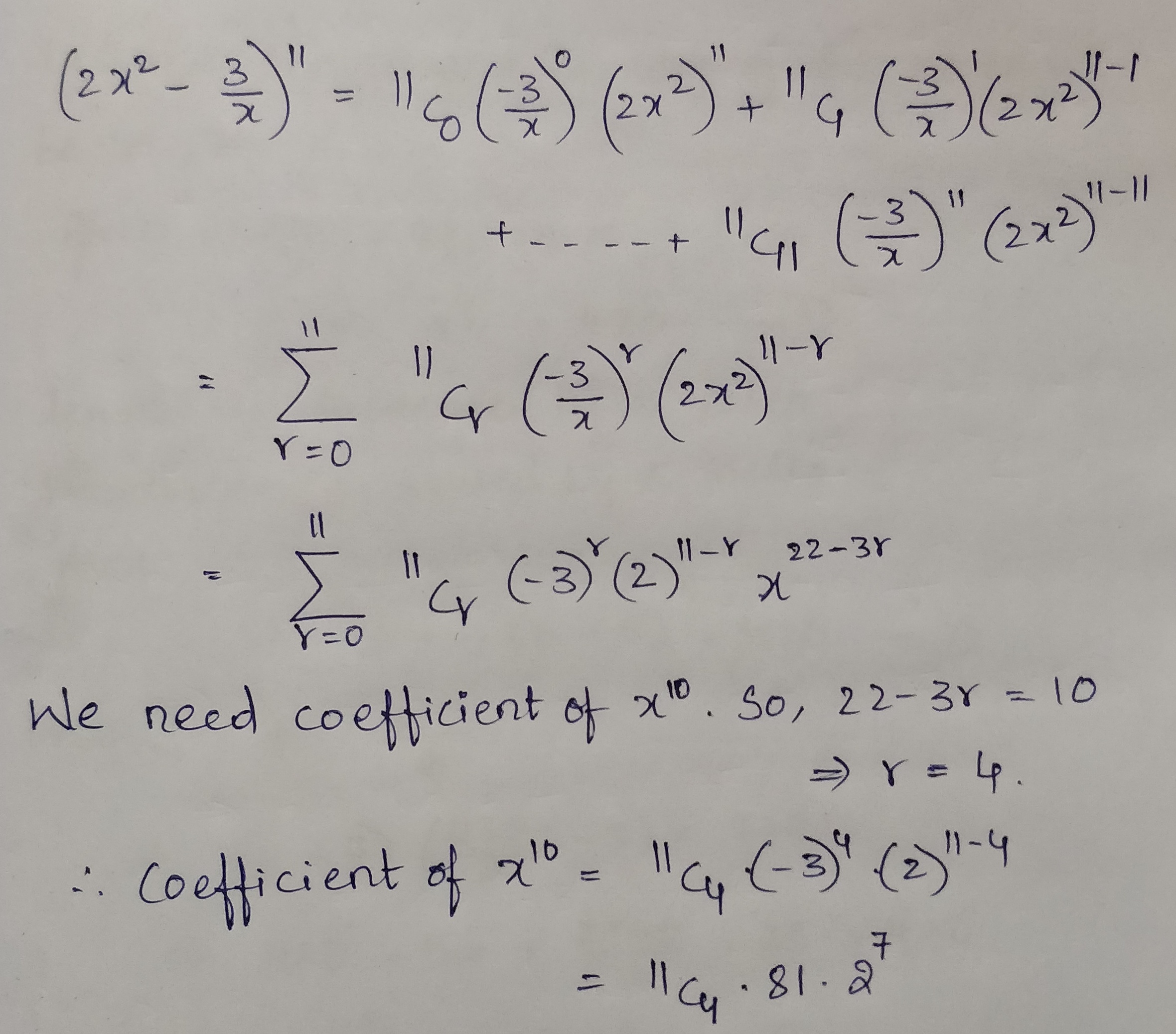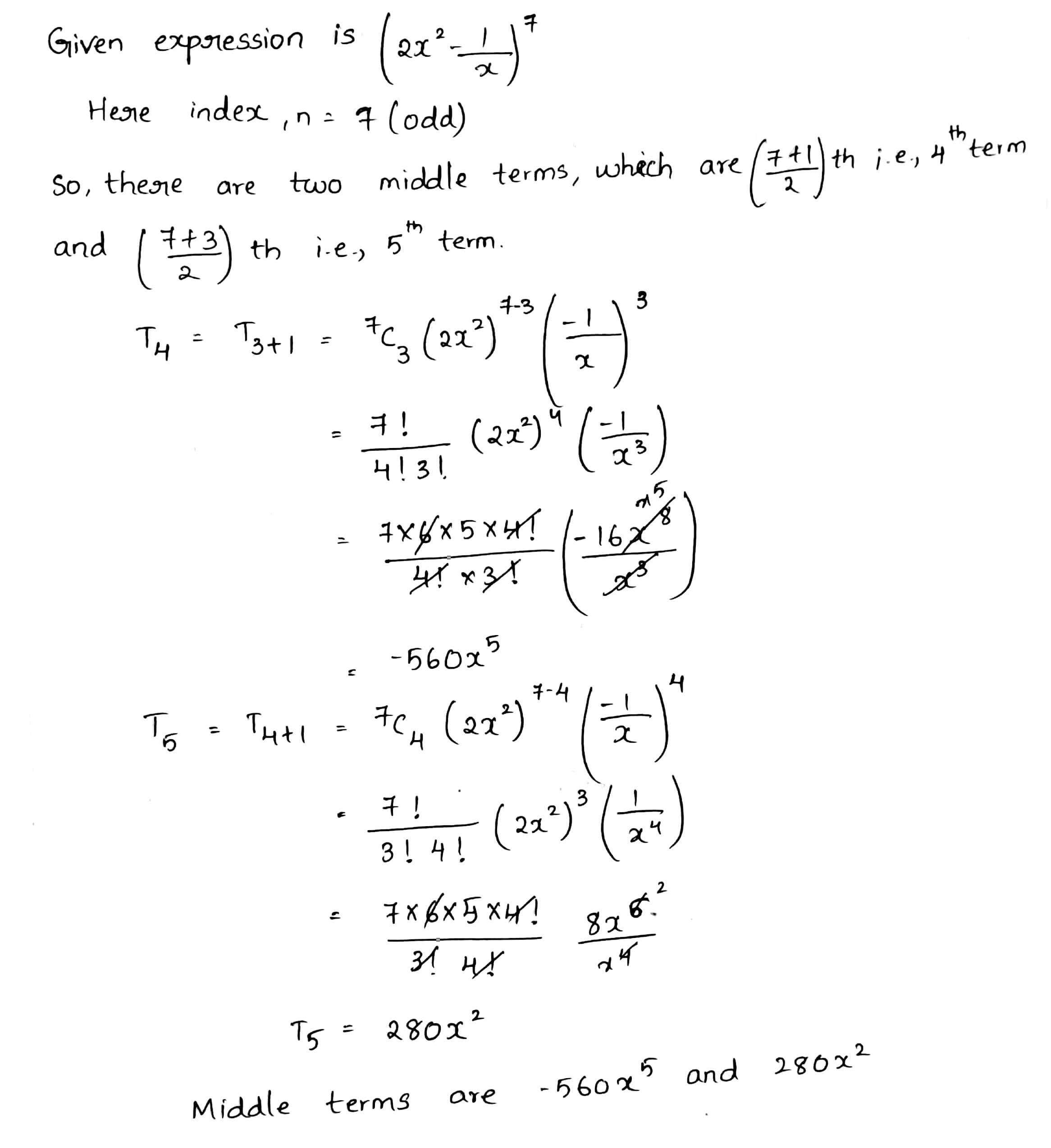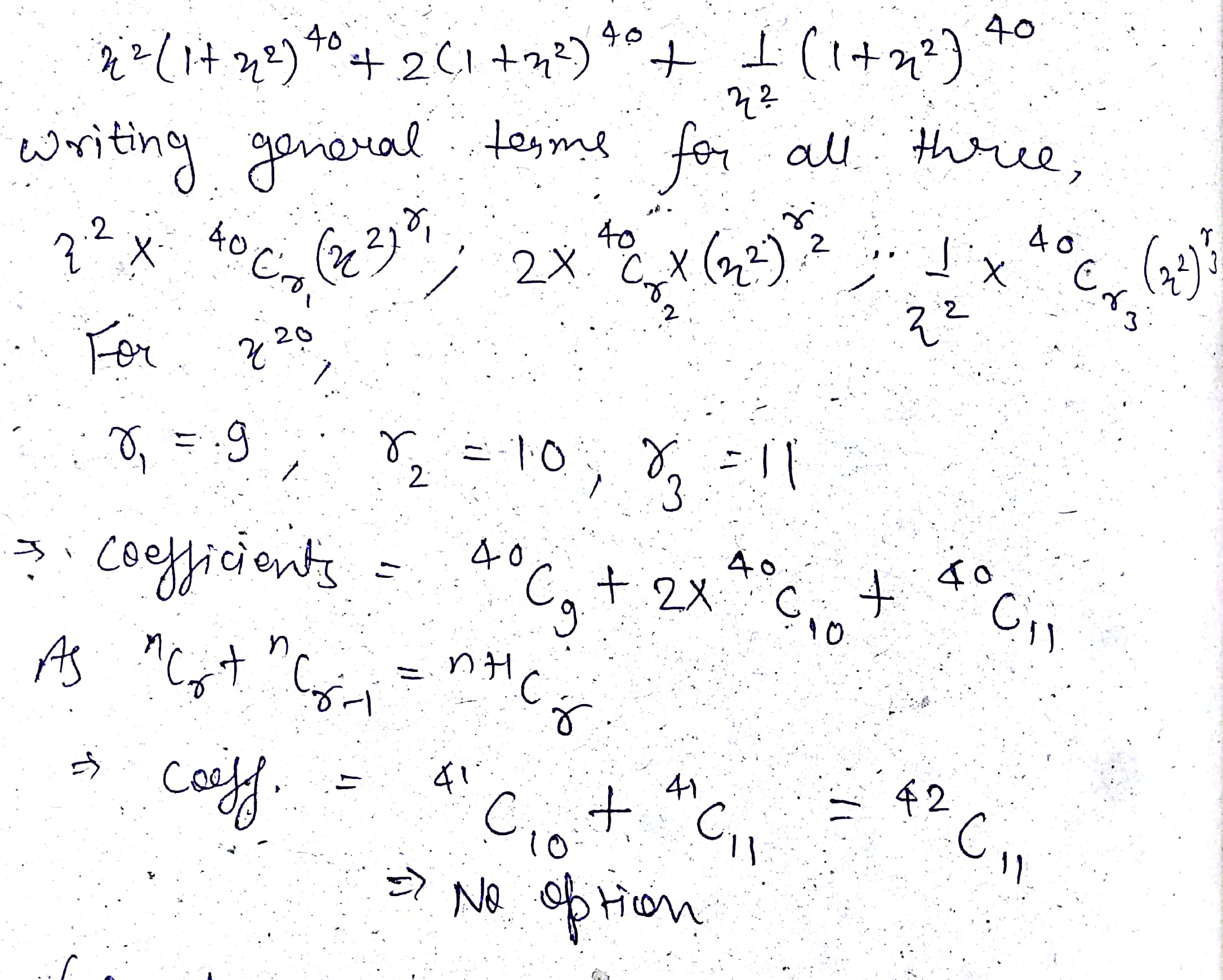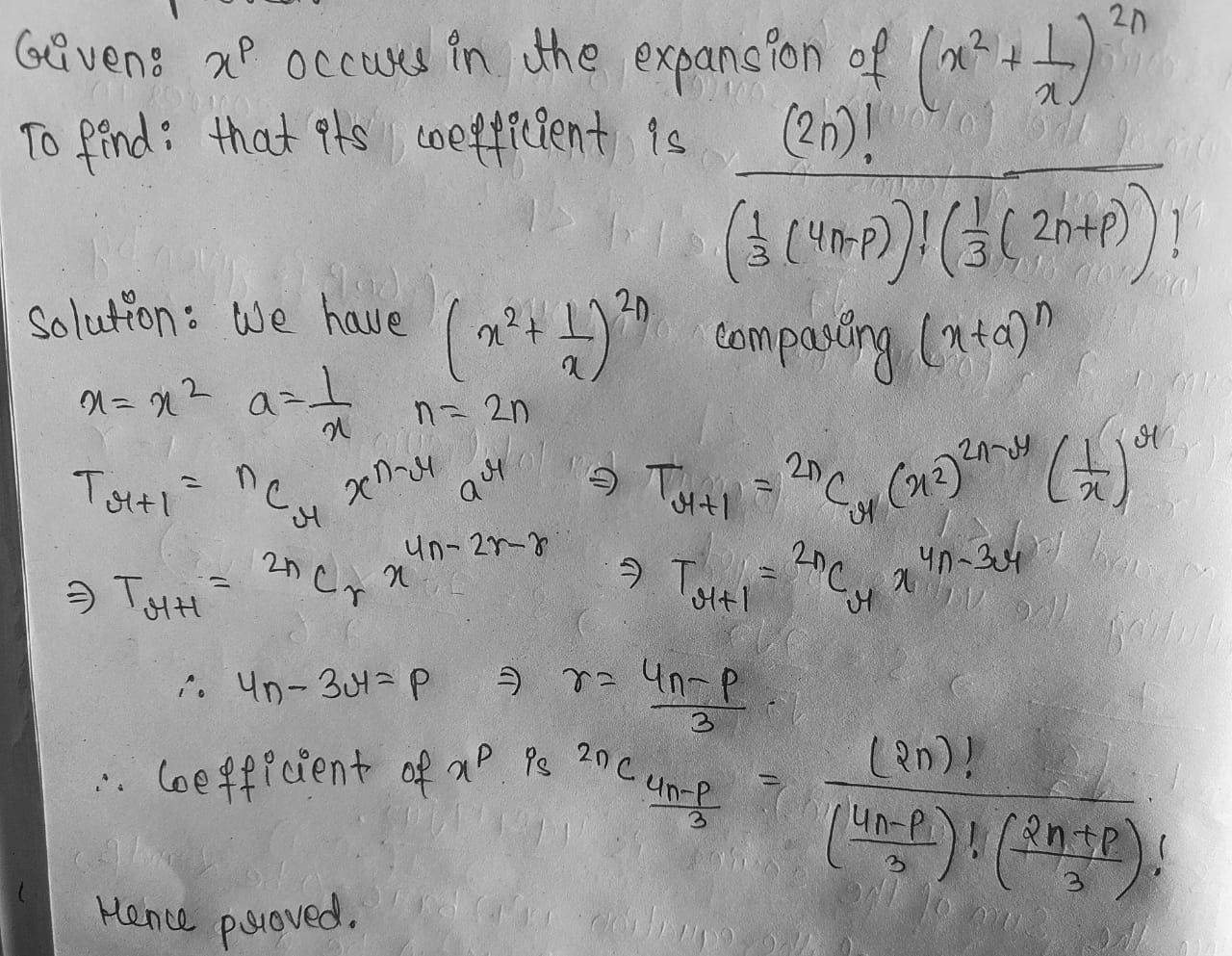Binomial Theorem - Class 11 Commerce Maths - Extra Questions
Find the sum of all rational terms in the expansion of $${ \left( { 3 }^{ 1/5 }+{ 2 }^{ 1/3 } \right) }^{ 15 }$$.
Find the number of terms in the expansion of $${ \left( \sqrt [ 4 ]{ 9 } +\sqrt [ 6 ]{ 8 } \right) }^{ 500 }$$ which are integers.
Find the coefficient of $$x^5$$ in $$(x+3)^8$$
The coefficient of three consecutive terms in the expansion of $${ \left( 1+a \right) }^{ n }$$ are in ratio $$1:7:21$$, then find the value of $$n$$.
$$\dfrac { { C }_{ 1 } }{ 2 } +\dfrac { { C }_{ 3 } }{ 4 } +\dfrac { { C }_{ 5 } }{ 6 } +...=\dfrac { { 2 }^{ n }-1 }{ n+1 }$$
Find the term of the expansion of $$(a + b)^{50}$$ which is the greatest in absolute value if $$\displaystyle\, \left | a \right | = \sqrt{3}\left | b \right |$$
Prove that the following equations hold for any natural n.
Prove that $$\displaystyle (C_{n}^{o})^2 \, + \, (C_{n}^{1})^2 \, + \, ... \, + \, (C_{n}^{n})^2 \, = \, C_{2n}^{n}.$$
Find the power $$n$$ of the binomial $$\displaystyle\, \left ( \frac{x}{5} + \frac{2}{5} \right )^n$$, if the ninth term of the expansion has the greatest coefficient.
Evaluate :
$$\left( {\dfrac{{{C_0} + {C_1}}}{{{C_0}}}} \right)\left( {\dfrac{{{C_1} + {C_2}}}{{{C_1}}}} \right)\left( {\dfrac{{{C_2} + {C_3}}}{{{C_2}}}} \right)\left( {\dfrac{{{C_3} + {C_4}}}{{{C_3}}}} \right)........\left( {\dfrac{{{C_{n - 1}} + {C_n}}}{{{C_{n - 1}}}}} \right)$$
If in the expansion of $$(1+x)^{20}$$, the coefficients of $$r^{th}$$ and $$(r+4)^{th}$$ terms are equal, then r is equal to?
If $$n> 2$$ then prove that $${C}_{1}(a-1)-{C}_{2}\times(a-2)+.....+{(-1)}^{n-1}{C}_{n}(a-n)=a$$,where $${C}_{r}={ _{ }^{ n }{ C } }_{ r }$$
Coefficient of $$x^{10}$$ in the expansion of $$\left(2x^2-\dfrac{3}{x}\right)^{11}, x\neq 0$$.
Find the middle term in expansion of $$\left (2x^{2} - \dfrac {1}{x}\right )^{7}$$.
Find a positivevalue of m for which the confficient of $$x^{2}$$ in the expansion $$\left ( 1+x \right )^{m}$$ is $$6$$
The coefficient of $${x}^{20}$$ in the expansion of $${(1+{x}^{2})}^{40}({x}^{2}+2+\cfrac{1}{{x}^{2}})$$ is
The $$2^{nd}$$, $$3^{rd}$$, $$4^{th}$$ terms in the expansion of $$(x+y)^n$$ are $$240$$, $$720$$, $$1080$$ respectively; find $$x, y, n$$.
In the expansion of $$(1+x)^{43}$$ the coefficients of the $$(2r+1)^{th}$$ and the $$(r+2)^{th}$$ terms are equal; find $$r$$.
Find the coefficient of $$x^{5}$$ in $$\left( x + 3 \right)^{n}$$
Find the coefficient of $$a^{5} b^{7}$$ in $$\left (a - 2b \right )^{12}$$
Find the number of term in the expansion of $$(x + a)^{200}+ (x - a)^{200}$$ after simplification.
Find the coefficient of $$x^{256}$$ in $$(1 - x)^{101} (x^{2} + x + 1)^{100}$$
If $$a_n$$ denotes the coefficient of $$x^n$$ in $$P(x)=(1+x+2x^2+....+25x^{25})^2$$, find $$\dfrac {a_5}{5}$$.
If the sixth term in the expansion of $${ \left( \cfrac { 1 }{ { x }^{ 8/3 } } +{ x }^{ 2 }\log _{ 10 }{ x } \right) }^{ 8 }$$ is $$5600$$, find $$x.$$
The value of $$p$$, for which coefficient of $$x^{50}$$ in the expression $$(1 + x)^{1000} + 2x (1 + x)^{999} + 3x^{2} (1 + x)^{998} + .... + 1001 x^{1000}$$ is equal to $$^{1002}C_{p}$$, is
Find $$n$$, if the ratio of the fifth term from the beginning to the fifth term from the end in the expansion of $${ \left( \sqrt [ 4 ]{ 2 } +\cfrac { 1 }{ \sqrt [ 4 ]{ 3 } } \right) }^{ n }$$ is $$\sqrt { 6 } :1$$
Let $$X = (^{10}C_{1})^{2} + (^{10}C_{2})^{2} + 3(^{10}C_{3})^{2} + .... + 10 (^{10}C_{10})^{2}$$, where $$^{10}C_{r}, r\epsilon \left \{1, 2, ..., 10\right \}$$ denote binomial coefficients. Then, the value of $$\dfrac {1}{1430}X$$ is
Evaluate $$\sum_{r = 0 }^{n } \, (r \, + \, 1)^3 \, C_r \, whee C_r \, = \, ^nC_r$$
If $$x^p$$ occurs in the expansion of $$\left(x^2+\dfrac{1}{x}\right)^{2n}$$, prove that its cofficient is $$\dfrac{(2n)!}{\left(\dfrac{1}{3}(4n-p)\right)!\left(\dfrac{1}{3}(2n+p)\right)!}$$.
Class 11 Commerce Maths Extra Questions
- Binomial Theorem Extra Questions
- Complex Numbers And Quadratic Equations Extra Questions
- Conic Sections Extra Questions
- Limits And Derivatives Extra Questions
- Permutations And Combinations Extra Questions
- Probability Extra Questions
- Relations And Functions Extra Questions
- Sequences And Series Extra Questions
- Sets Extra Questions
- Straight Lines Extra Questions
- Trigonometric Functions Extra Questions



